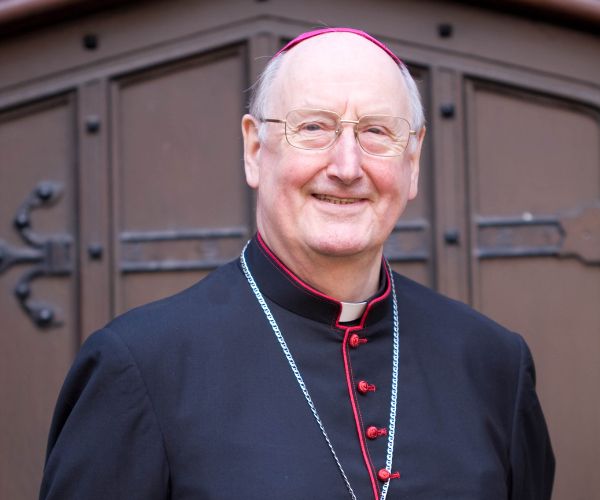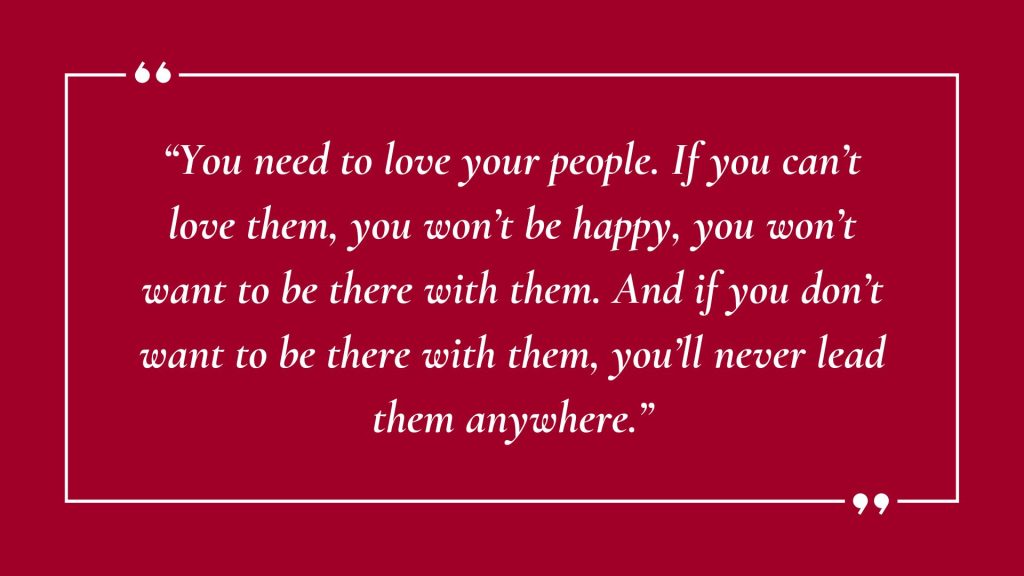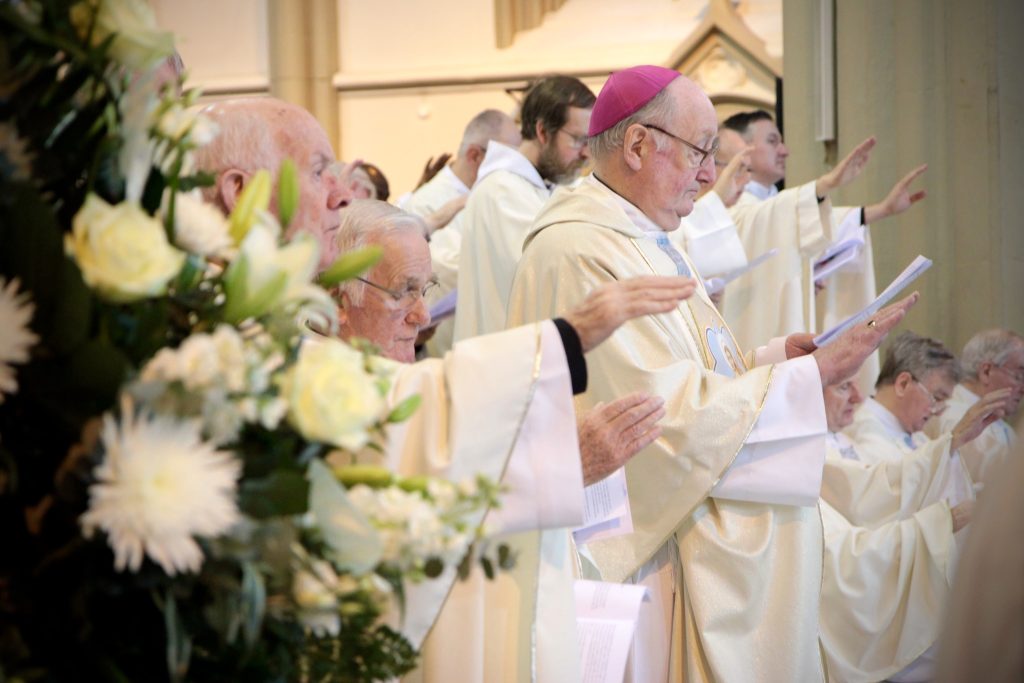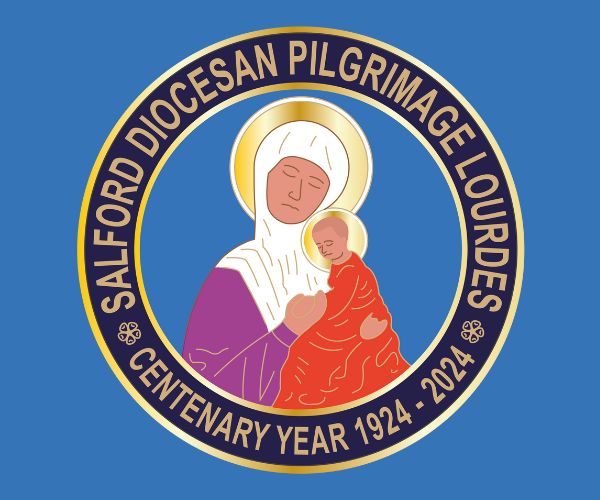
A Vocations Story: A Ministry of Love and Service
Thursday 25th April 2024Earlier this year, Bishop Terence Brain – Bishop Emeritus of Salford – celebrated his diamond jubilee and spoke to our vocations team to share his memories, thoughts, and findings from 60 happy years of ministry.
Childhood aspirations are fond memories for each and every one of us, but sadly, our dreams of becoming an astronaut, spy, or president of the United States rarely come to fruition in adult life.
But Bishop Brain’s childhood dream of becoming a priest was the exception to prove the rule, as he recalls the first time his vocation stirred in his mind.
“When I was little, it was common. It wasn’t out of the ordinary at 11 or 12 to say you wanted to be a priest – it was just one stage away from saying you wanted to be a fireman.
“I was in Year 6 in primary school and there was a family who lived in the parish where I lived in Coventry and they had a son, who had become a priest with the Missionaries of Africa. It must have been the year he was ordained, and he came back to school and came around the classes and I remember him coming to our class and talking to us about being a priest in Africa.
“I remember sitting there thinking, “that’s brilliant” – so I went home and told my mother I was going to be a priest and go to Africa. It was a total venture of the imagination but that’s the first idea I had about it.”
Over the years, influential figures such as an uncle in the priesthood, a priest who prayed with him and brought Holy Communion to him during a long stay in hospital, and a motherly teacher who exuded a sense of holiness and goodness had a subtle but lasting effect on the young Terence Brain.
“My mum – it always starts with your mum”, Bishop Brain explained, “I’d told her about wanting to be a priest and I must have mentioned it to her more than once in different ways because she asked me if I was serious about it. But, you see, at the age of 11 or 12, what does serious mean? What do you know about it? So, it wasn’t set in stone, but she went to see the parish priest and asked for his advice.”
Eventually, it was decided that he would apply for The Bishop’s Scholarship, and after passing the exam, he was enrolled at Cotton College, which was a school run by the Archdiocese of Birmingham in North Staffordshire.
The school provided a top-quality education for boys in an environment that was Church run, with around 25% of pupils expressing a desire to join the priesthood.
Bishop Brain recalled: “There were 17 boys in my class wanting to become priests. Two of us were ordained. You see, we were 11 – the time you grew up, reached 15 and got pimples, it didn’t make sense anymore. Some found the academic side challenging, others came across other circumstances that drew them away – there was no one reason.”
After six years at Cotton College, Bishop Brain went to seminary before being ordained in 1964.
“I never had any doubts. It sounds arrogant but I never doubted I would be ordained a priest – I never expected any of the things that happened after, but I never doubted I would be a priest.”
Bishop Brain’s first appointment was at the parish of St Gregory’s in Longton, Stoke on Trent. Just one year after the start of the Second Vatican Council, the beginning of Fr Brain’s ministry was a time of incredible upheaval and change for priests and parishioners alike.
Reflecting on this time, Bishop Brain said: “I wasn’t a clerical sort of priest. For me it was about being involved with the people. I like people – they’re made in the image and likeness of God! It’s about encouraging them to fulfil themselves by helping them meet God and helping them get to know him.”
This idea of finding fulfilment and closeness with God is highlighted by Bishop Brain as a key part of the discernment process, who recommends a simple, quiet pattern of prayerful conversation with God to unpick that sense of vocation.
He said: “Talk to him about it. Just say, “Thank you for today. Did I go where you wanted me to go today, God? Did I come up to scratch? I need you to guide me; I need you to talk to me. And the trouble is, God, I don’t really know how to listen to you.”
“It’s about having that confidence to be yourself for God. Just be you and he’ll look after all the other bits.”
A few years into his ministry, Bishop Brain took up the position of hospital chaplain at Dudley Road Hospital, Birmingham.
He said: “When you’re in hospital, you’re not in your own space anymore: you’re in someone else’s space, you’re not in control. In hospital it all looks structured and efficient and without you being involved. This can make us feel anxious, isolated. So, I learnt to say “Hello” and “Good bye” in the languages of the patients – many of whom did not speak English as a first language – as a simple way of acknowledging them as persons.”
Bishop Brain shared one story of a salt-of-the-earth woman who was in hospital for many number of weeks. Greeting Fr Brain each visit with a broad Birmingham accent, she became a familiar face during his visits, always saying: “Don’t you worry about me, Father, you go and talk to one of them that needs you. I’ll let you know if I need you.” Repeating this same exchange week in, week out, Fr Brain never expected the woman to say any more until one day she stopped him and said: “You know that prayer you’re going to say for me, Father? You can say it now, I think I’m going to need it now.” She died that night.
“It’s little things like that over your life that takes the arrogance out of you,” Bishop Brain said. “You think you know it all because you’ve read the books for so long, but you don’t.”
These human interactions became the hallmark of Bishop Brain’s vocation as he championed a priesthood that puts people, love, and service at the centre of the ministry.
He explained: “The professors at seminary would say not to read your theology as an academic exercise. You can get enthused from the academic stimulus of working out the logic but that’s not what theology is. Theology is meeting God. You’ve got to meet God.
“You find people in your life who have met God and they’ve never even opened a theology book. They might not even read scripture all that much but recite an Our Father, Hail Mary, and Glory Be for their prayers. But they’ve met him.”
This virtue of accompaniment and sense of walking with people is a legacy of his priesthood that followed Bishop Brain to Salford, as he worked to manage the structure and organisation of parish communities in our diocese.
Acknowledging that the success of any organisation – including our own diocese – relies on a sense of collaboration, Bishop Brain was keen to ensure the happiness of his priests to nurture the best of their ministry.
He said: “You try your best to consult people and work with people, so I’d ask priests if they could go to this parish or that parish, but I’d say to them: “You need to love your people. If you can’t love them, you won’t be happy, you won’t want to be there with them. And if you don’t want to be there with them, you’ll never lead them anywhere.”
Although retired now, Bishop Brain remains a popular and welcome face across the diocese, offering a helping hand to his parish priest whenever called upon, and cherishing the connections and relationships he forged over 17 years at the helm of our diocese.
Reflecting back over 60 years of priesthood – and back to that very first sense of calling as a primary school pupil – Bishop Brain laughs as he describes his ministry as “happy, enlightening, and rewarding.”
He said: “It’s brought me contentment as a person. If I were to speak to someone discerning now, I would say, “Don’t be afraid of the priesthood – don’t think you won’t be happy. If you embrace it, you will be. It won’t necessarily be easy – we all have our crosses but it’s our crosses that make life stimulating, because we have to find ways around the problems we face.”
“When I look back over my life, if I’m honest I’ve got to say I’ve enjoyed it! I mean there are all the ups and downs of life but someone said to me the other week: “60 years – it’s a long time. Would you do it again?” And I said, “Oh yes, I would. But I’d try and do it better.”
Tagged | Catholic Church | Diocese | Priesthood | vocations





